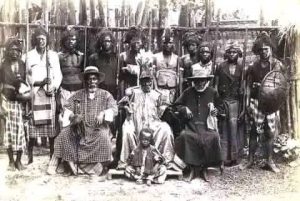
1. Ijaw (c. 5,000 BC)
Among Nigeria’s earliest inhabitants, the Ijaw people have lived in the Niger Delta region for over 7,000 years, engaging in fishing, trade, and cultural preservation.
2. Yoruba (c. 2000 BC)
The Yoruba trace their roots back to the ancient city of Ife, with legends of Oduduwa’s establishment of the kingdom over 4,000 years ago, contributing significantly to West African civilization.
3. Igbo (c. 2,500 BC)
Known for their early communities and trade systems, the Igbo people have thrived in southeastern Nigeria for thousands of years, creating strong cultural and political structures.
4. Hausa (c. 1000 AD)
The Hausa people established kingdoms like Daura and Kano, blending indigenous and Islamic influences. Their history dates back around 1,000 years.
5. Kanuri (c. 700 AD)
With origins in the Kanem-Bornu Empire, the Kanuri have a longstanding history of trade and scholarship, dating back over 1,300 years in present-day Borno.
6. Nupe (c. 900 AD)
The Nupe people of Niger State have a history dating back more than 1,100 years, influencing regional art and governance, especially along the Niger River.
7. Tiv (c. 2000 BC)
Residing in the Benue region, the Tiv people’s history spans thousands of years, marked by a strong oral tradition and social unity that preserves their heritage.
8. Edo (Bini) (c. 11th century AD)
The Edo people’s history is anchored in the Benin Kingdom, which became a center of art and governance in West Africa around the 11th century.
9. Ibibio (c. 3000 BC)
The Ibibio, among the earliest settlers in southeastern Nigeria, have a distinct culture dating back over 5,000 years, with a history of agricultural and artisanal traditions.
10. Gwari (Gbagyi) (c. 3000 BC)
The Gwari people have lived in the Niger and Kaduna regions for thousands of years, maintaining unique customs and cultural practices dating back 5,000 years.
Peoplesmind
